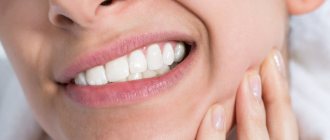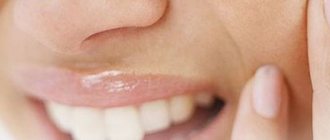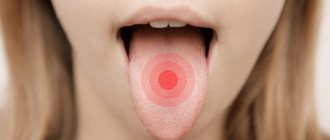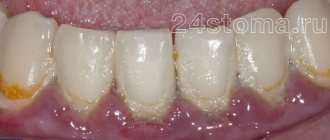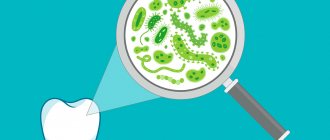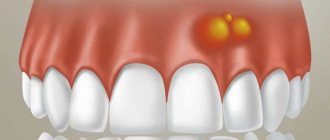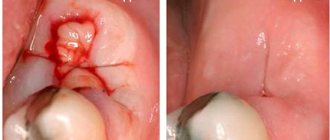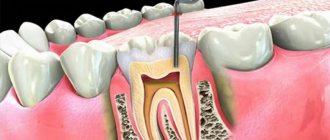In those distant times, when I was a little girl, and the bur machine sounded and speeded more like a drill, I was usually dragged into the dentist’s office along with the bench. My compassionate grandmother then tried more than one folk recipe for pain relief on me. Now, of course, it's different. I came to a smiling dentist, sat down in a chair, and some even say that I relaxed. What if it's night? Does your tooth hurt? "Help yourself!" called. But how to do this without harming your health? How to save a bad tooth? Ekaterina Ivanova, candidate of medical sciences, surgeon and Anna Redko, orthodontist, answer our painful (literally) question.
Initially, you need to figure out what the cause of the pain is and how serious it is. Dentists have been studying this for years, but briefly and without scientific details, the situation is approximately as follows.
When average caries occurs (the appearance of a defect in the tooth wall), which in our understanding is “ordinary” caries, the tooth reacts painfully to sour, sweet and other food irritants
. In rare cases, there is no pain; the defect can be closed by an adjacent tooth or gingival papilla.
The next stage in the development of tooth damage is deep caries. This means that the dental nerve is very close and inflammation may soon spread to it. In this case, the tooth reacts painfully not only to sour and sweet foods, but also to thermal irritants - especially cold.
An important feature: with all types of caries, the pain immediately stops after removing the irritant.
When the nerve of the tooth is damaged - pulpitis, the pain can be paroxysmal, acute, worse at night, from cold (at the initial stage) and from hot.
With pulpitis, unlike caries, the pain does not disappear immediately after the irritant is removed. We do not advise anyone to wait out pulpit pain! If the nerve dies, the pain will also disappear, but without the qualified help of a dentist, an infection will remain, which will spread further beyond the tooth into the bone tissue.
What are they made of?
The main advantage of these drops is that they consist only of natural ingredients. Today there are many variations of drops, but the base is almost always the same:
- Camphor extract. Destroys pathogenic microorganisms in the oral cavity, fights the inflammatory process.
- Valerian. Has a mild sedative and analgesic effect.
- Peppermint. It dampens pain and has a natural antibacterial effect.
- Glycerol. Necessary to create a slight viscosity.
Additionally, additional ingredients may be present.
Ways to relieve acute toothache:
- Carefully remove all food debris from the interdental spaces and from the cavity in the tooth, and subsequently maintain it in a clean condition.
- Rinse the tooth with a warm soda solution (1 teaspoon per glass of water).
- Hold a large sip of vodka over the sore tooth. The gums will absorb some of the alcohol and the tooth will become numb.
- Suck on a piece of ice. You can also apply ice to the affected tooth or adjacent cheek for 15 minutes at least 3 or 4 times a day.
- Massage your hand. This can relieve pain by 50% when a tooth hurts. Rub an ice cube into the V-shaped area where the bones of the thumb and index finger meet. Gently apply the ice in small increments to the area for 5 to 7 minutes. The effect of this procedure is based on the fact that friction sends impulses along the nerve pathways through which toothache is normally transmitted. Because these pathways can only carry one signal at a time, friction displaces pain.
- Do not chew on the affected side.
- Keep your mouth closed if the flow of air over the sore tooth increases the pain.
- Keep your mouth open. Sometimes toothache gets worse because a person has an incorrect bite. In this case, close your mouth as little as possible until the dentist takes a look.
- Take a pain reliever (analgin, baralgin, sedalgin...). The only thing I would like to warn against is aspirin, since its analgesic effect is not great and it is necessary to take it in large quantities, which are unsafe for health. Taking painkillers must be stopped no later than 3 hours before your visit to the doctor, because this can distort the picture of the disease and make diagnosis difficult.
- It is important not to apply any warm compresses or lotions - this procedure can significantly worsen the situation and complicate further treatment.
- It is strictly forbidden to take antibiotics without qualified consultation and a doctor’s prescription. In general, taking antibiotics for any disease is a very responsible procedure. These drugs are taken according to a special regimen, and not 1 tablet 3 times a day, as patients often think. Taking one pill “just in case” will bring nothing but harm.
This is all you can do before visiting the dentist. And don’t be afraid of the on-call clinic, because in most cases you can relieve acute symptoms without removing the tooth or putting a permanent filling.
How do they work?
The above components individually are not capable of leading to the desired result, but a complex of medicinal ingredients leads to a positive result. First of all, it is worth noting a decrease in the intensity of the inflammatory process. Active substances destroy microbes in the mouth, which are often the culprits of pain. Some components act on nerve endings, which leads to a reduction in pain.
Please note that this remedy cannot cure the cause of the pain. Dental treatment can only be performed by a dentist. Dental drops have a temporary effect, helping to cope with discomfort until you go to the doctor.
Remedies that can be used to dull the pain before meeting the dentist:
Rinsing.
These can be either home remedies, prepared with your own hands, or medicinal ones. Homemade ones include: a warm solution of water with soda, a decoction of chamomile, sage, calendula or oak bark, which can be used to rinse the tooth several times a day (on average three to five times), or you can simply keep it on the sore side.
Medicines
- ready-made concentrated alcohol solution, mixture of herbs - stomatophyte. Rinses such as Colgate, Blend - a - Med are additional oral hygiene and do not have an analgesic effect. There are also anti-inflammatory drugs such as Nice, Ibuprofen, Xefocam. It should be borne in mind that taking a very large amount of painkillers when visiting a doctor reduces sensitivity to local anesthetics.
Causes of night toothache
To find out why teeth hurt at night but not during the day, you need to know the main factors contributing to the occurrence of this disease. Practicing medical professionals identify the following main reasons:
- Violation of the integrity of the tooth crown.
- Painful reaction to a decrease or increase in temperature (occurrence of caries).
- Severe swelling of the gums and, as a result, an increase in body temperature (flux).
- Persistent pain in the upper jaw (sinusitis).
- Acute toothache radiating to the temporal region (pulpitis, wisdom tooth periodontitis).
- Various dental injuries.
- Inflammatory processes of the middle ear.
- The appearance of acute purulent processes in the jaw.
Aching toothache at night feels more painful than during the daytime. This factor is explained by physiological and psychological manifestations. The first are associated with strengthening or weakening the functioning of organs directly related to the condition of the teeth. The developing swelling compresses the nerve approaching it. This sharply increases the pressure in the internal part. And as a result, severe pain appears.
By morning they may weaken or disappear altogether. Experts associate this with the functioning of the adrenal glands. These organs are responsible for stopping the development of inflammatory processes. In the morning hours they are especially active and efficient. Thanks to their positive effects, painful phenomena do not appear so strongly. In the evening and at night, special hormones that suppress pain processes are not released. A person experiences persistent sensations that cause general harm to health.
During the daytime, a person is busy almost the entire period. He is surrounded by everyday hassles and problems, whether he is working or studying. He has no time to think about the present toothache. Even if it is activated, it does not cause unpleasant consequences against the backdrop of a busy daytime.
At night, especially before five o’clock in the morning, the body is in a completely relaxed and unprotected state. The reaction to any, even the most minor, pain and inflammation increases. A person is very sensitive to any influence. Accordingly, toothache intensifies at night.
Products that should NOT be used:
1. Vodka rinses.
We will have to upset the men who rinse their mouths with vodka and claim that it helps. Alas, neither external nor internal treatment will relieve you of toothache. Although if you overdo it with the amount of “medicine”, it will dull the pain, but subsequently the vessels will dilate and all inflammatory reactions will only intensify. In addition, as a result of such treatment, a burn and ulcer of the mucous membrane is possible, as a result of which the picture of the inflammatory process will be blurred.
2. Smoking.
It is a common belief that smoking a cigarette dulls pain. For smokers, in principle, a cigarette is a distracting object. Just like alcohol, it has an adverse effect: nicotine constricts blood vessels and in the area where inflammation should be actively fought, the flow of necessary substances is suspended.
3. Warm compresses.
It is not recommended to apply heat to all inflammatory processes, as this only intensifies them.
4.Antibiotics.
You cannot start self-medicating with antibiotics, even if the doctor once prescribed “exactly the same” ones, since in the process of an incorrect course of treatment microbes that are very resistant to drugs can form.
Conclusion: if you dull the pain of a tooth affected by caries, pulpitis or periodontitis and put off visiting the dentist, then very soon you will have to resort to more expensive and complex forms of treatment.
Interviewed by Anna Sitnik
Mandatory visit to the dentist
However, in any case, severe toothache at night will not completely disappear. We can only reduce the unpleasant aching sensations. The dentist can finally relieve the pain.
The dentist will identify the main causes of pain symptoms and will structure the treatment process in such a way as to effectively remove even the slightest manifestations of pain. And the main thing that you should always remember is timely prevention and systematic medical examinations. With this approach to your health, you won’t be afraid of any pain at night.
If your tooth hurts, you need to go to the doctor
Stitching and cutting toothache is a symptom of dental disease. They may be caused by the following reasons:
- poor oral hygiene;
- vitamin deficiency;
- decreased immunity;
- jaw injuries;
- incorrect position of teeth.
Only a dentist can make the correct diagnosis and prescribe an effective solution. Therefore, the surest way to deal with toothache is to visit a specialist as soon as possible. If you are experiencing similar pain right now, call 8 (495) 221-21-18 or fill out the online registration form. Tell the administrators about the pain that is bothering you, and they will find the next time for you to see a dentist.
What first aid should be given for night toothache?
How can you relieve toothache at night if it does not subside? Dentists recommend immediately taking certain actions:
- Taking fast-acting painkillers.
- Rinsing the mouth with herbal compositions.
- Use of traditional folk remedies.
The first method means the effective use of the most common drugs. You should always have a sufficient quantity of Analgin, Pentalgin, and Aspirin tablets in your home medicine cabinet. Paracetamol. These products are affordable and have a quick positive effect. For young patients suffering from night toothache, it is recommended to use Ibuprofen or its analogues.
It is recommended to soften solid preparations to a powder state. Place a small amount on the affected area. And try to leave the tooth with the applied medication for at least half an hour.
Tooth pain at night is excellently eliminated with various herbal formulations. Mint, lemon balm, sage, oak bark, calendula, and chamomile perfectly soothe aching pain. It is recommended to prepare a solution yourself from dried herbs and flowers or use a ready-made tincture. Several mouth rinses will help soothe pain and stop its further development.
Many folk tips also help with toothache at night. They have been tested by centuries of practice and always provide effective assistance.
A true and proven method is to place a piece of salted lard on the sore part of the gum. This is a completely harmless, and also edible, method.
A cotton ball soaked in alcohol acts as an anesthetic on the aching tooth.
Applying ice to the outside of your cheek can help dull annoying nighttime pain symptoms.
A warm aqueous solution of table salt has an excellent effect on an inflamed tooth.
When you shouldn't go to the doctor
Often, when eating, we are faced with the fact that our teeth respond to us with incomprehensible “signals” - they begin to “cramp” and itching appears. You shouldn’t immediately sound the alarm - these may not be signs of dental disease, but simply evidence of illiterate food intake. This reaction is often caused by eating food that is too cold or too warm, or, even worse, by suddenly changing cold and hot foods (and vice versa).
Sudden changes in temperature not only cause toothache, but can also seriously damage tooth enamel. You shouldn’t eat ice cream after a cup of hot coffee - this could result in your tooth simply cracking! If a tooth hurts due to temperature changes, the toothache itself in such cases does not pose a danger - it is a reaction of your teeth to a “stressful” situation for them.
Another feature of the body that can cause toothache is the teeth’s sensitive response to weather changes. Sub-zero temperatures and icy cold can cause minor toothache, which will not be a sign of serious illness. This is a normal reaction of the body to weather conditions. To reduce discomfort from extremely cold temperatures, wear warm hats, turtleneck sweaters, and scarves that cover your neck and lower face.
